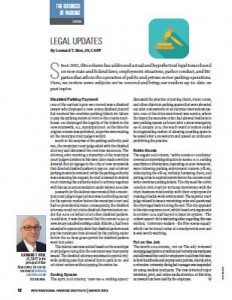Since 2011, this column has addressed actual and hypothetical legal issues based on new state and federal laws, employment situations, parker conduct, and litigation that affects the operation of public and private sector parking operations. Here, we review some subjects we’ve covered and bring our readers up-to-date on past topics.
Disabled Parking Payment
One of the earliest topics we covered was a disabled lawyer who displayed a New Jersey disabled placard but received two overtime parking tickets for failure to pay the parking meters in front of the county courthouse. He challenged the legality of the tickets in the New Brunswick, N.J., municipal court. At the time the original column was published, all parties were waiting for the municipal court judge’s verdict.
Much to the surprise of the parking authority (and me), the municipal court judge sided with the disabled attorney and dismissed the overtime summons. The attorney, after receiving a transcript of the municipal court judge’s decision in his favor, later made a written demand that all signage in the City of New Brunswick that directed disabled parkers to pay on- and off-street parking meters be removed. While the parking authority was evaluating his request, he filed a lawsuit in federal court claiming the authority failed to actively negotiate with him as an accommodation under federal ADA law.
Research for the federal case revealed that a municipal court judge’s legal opinion was nonbinding except for the specific matter before the municipal court and had no precedential value. Consequently, the disabled attorney could not claim disabled discrimination under the ADA on behalf of all other disabled parkers. In addition, it was discovered that the current State of New Jersey Disabled Parking Guide, Edition 2, had been amended to specifically state that disabled parkers must pay the maximum time allowed by the parking meter before the 24-hour grace period for disabled parkers went into effect.
The federal case was settled based on the municipal court judge’s ruling that the summons was improperly issued. The disabled attorney was issued a special citywide parking pass that allowed him to park at on- and off-street meters without paying the meter fee.
Saving Spaces
The April 2013 column, “Save Me A Parking Space,” discussed the practice of putting chairs, traffic cones, and other objects in parking spaces that were shoveled out after a snowstorm in an informal reservations system. One of the cities mentioned was Boston, where the mayor, by executive order, had allowed residents to save parking spaces 48 hours after a snow emergency. As of January 2015, the South Ward of Boston ended its longstanding custom of allowing a parking space to be saved after a snowstorm and passed an ordinance prohibiting the practice.
Robin Hoods
The August 2013 column, “Robin Hoods or Hoodlums,” covered an interesting situation in Keene, N.H. Parking anarchists or libertarians, depending on your viewpoint, were following parking enforcement officers (PEOs), videotaping the PEOs, verbally harassing them, and putting coins in expired meters before the officers could write overtime parking tickets. The city sued the Robin Hoods in civil court for tortuous interference with the city’s business relationship with their employees for creating a hostile work environment. The superior court judge refused to issue a restraining order and questioned the city’s legal basis for filing the suit. The city appealed to the state supreme court, which heard oral arguments in October 2014 and has yet to issue its opinion. “The Colbert Report” did a fascinating video regarding this case entitled, “Difference Makers—the Free Keene Squad,” which can be found online at comedycentral.com and is well worth watching.
Pot on the Job
The March 2014 column, “Pot On The Job,” reviewed emerging legalization of medical and recreational marijuana and addressed the need for employers to address this issue in their handbooks and employment policies. Shortly after, a Princeton University dining hall manager was suspended for using medical marijuana. The case attracted major television, print, and online media attention. At this time, no lawsuit has been filed by the employee.
Leonard T. Bier, JD, CAPP, is the principal of Bier Associates. He can be reached at lenbier@optonline.net or 732.828.8864.

